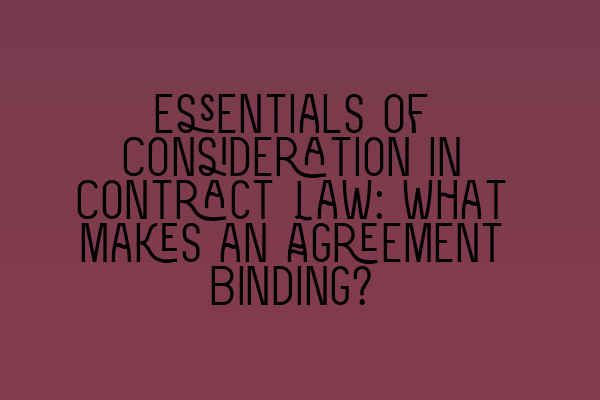Essentials of Consideration in Contract Law: What Makes an Agreement Binding?
When it comes to creating a legally binding agreement, one of the key elements that must be present is consideration. Consideration is what each party gives or promises to give in exchange for something from the other party. It is a fundamental principle of contract law that helps determine the enforceability of an agreement. In this article, we will explore the essentials of consideration and what makes an agreement binding.
Understanding Consideration
In contract law, consideration refers to the value exchanged between the parties involved in a contract. It can be in the form of money, goods, services, promises, or even refraining from doing certain actions. Consideration is what makes a contract legally enforceable and distinguishes it from a mere promise or gift. Without consideration, an agreement may not be binding.
Consideration serves several important purposes in contract law:
- It acts as an indicator of the parties’ intention to be legally bound. When a person agrees to give something or perform a service in exchange for something else, it shows that they are serious about entering into a contractual relationship.
- It ensures fairness and equity in the agreement. Both parties must provide something of value to create a balanced exchange.
- It provides a remedy for breach of contract. If one party fails to fulfill their promise, the other party can seek legal remedies based on the consideration provided.
Consideration doesn’t have to be of equal value between the parties, but it must be sufficient. In other words, the consideration should be something that has some degree of value in the eyes of the law. It doesn’t necessarily have to be adequate or fair, as long as there is a bargained-for exchange. For instance, if Party A agrees to pay Party B a nominal fee of £1 for a valuable piece of artwork, the court will still consider it valid consideration.
Elements of Consideration
For consideration to be valid, it must meet certain requirements:
- Legal Value: Consideration must have some legal value. It can be money, property, a promise to do something, or a promise to refrain from doing something. It cannot be an illegal act or consideration that is morally or socially prohibited.
- Exchange of Value: There must be an exchange of value between the parties. Each party must give or promise something of value in return for the other party’s promise or act.
- Intent to Create Legal Relations: Both parties must intend to be legally bound by their promises. This means that the agreement must not be a casual statement or a social arrangement where legal consequences were not intended.
- Clear and Precise Terms: The terms of the agreement must be clear and precise. Both parties must know and understand what is expected of them as part of the consideration.
These elements of consideration work together to form a valid and enforceable contract. It is essential to ensure that all these requirements are met to avoid any potential issues or disputes in the future.
The Role of Consideration in Contract Enforcement
Consideration is crucial to the enforceability of a contract. Without valid consideration, a contract may be deemed void or unenforceable. When a party breaches a contract, the other party can seek remedies such as damages or specific performance based on the consideration provided.
It’s worth noting that consideration does not need to flow simultaneously, and it can be executed before or after the other party’s promise. It can also be executed in the form of a past act if it was done at the request of the other party.
Consideration is closely linked to other contract law principles such as offer and acceptance, intention to create legal relations, and capacity to contract. Understanding and applying these principles is vital when drafting or entering into a contract.
Conclusion
In summary, consideration is an essential element of contract law that makes an agreement binding. It is the exchange of value between parties and acts as evidence of their intention to be legally bound. Valid consideration must have legal value, an exchange of value, an intent to create legal relations, and clear and precise terms. Without consideration, a contract may be deemed unenforceable. Understanding the essentials of consideration is crucial for both solicitors and individuals entering into contracts to ensure their agreements are legally valid and enforceable.
For more insights into contract law and related topics, check out these articles:
- Exploring the Impact of Frustration on Contractual Obligations: Legal Insights
- Interpreting Contractual Clauses: Unlocking the Hidden Meanings
- Legal Aspects of Business Contracts: Key Considerations for Entrepreneurs
- Agreements in Contract Law: Understanding Its Various Types
- Essentials of Consideration: Understanding the Basis of Contractual Exchange
